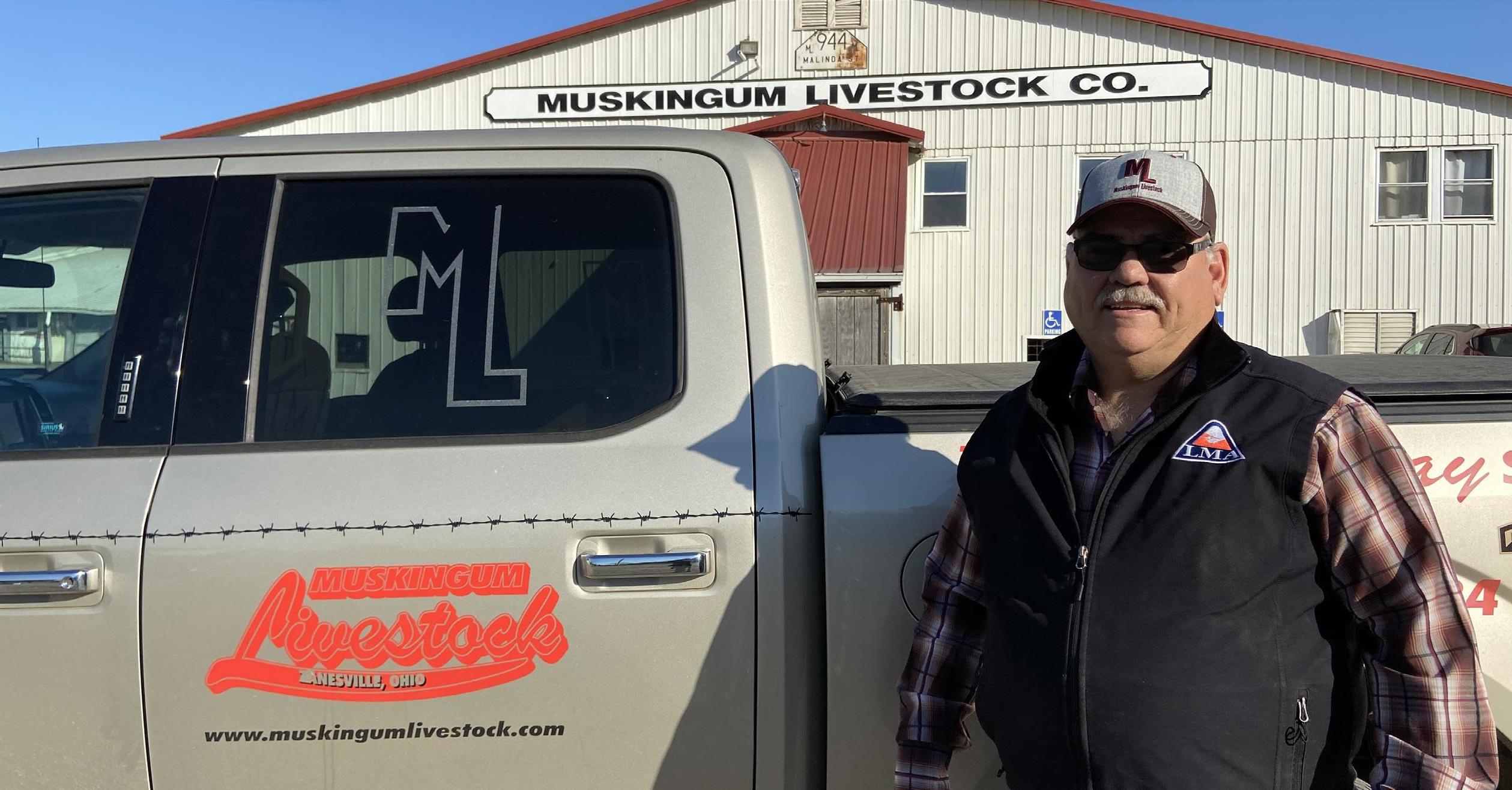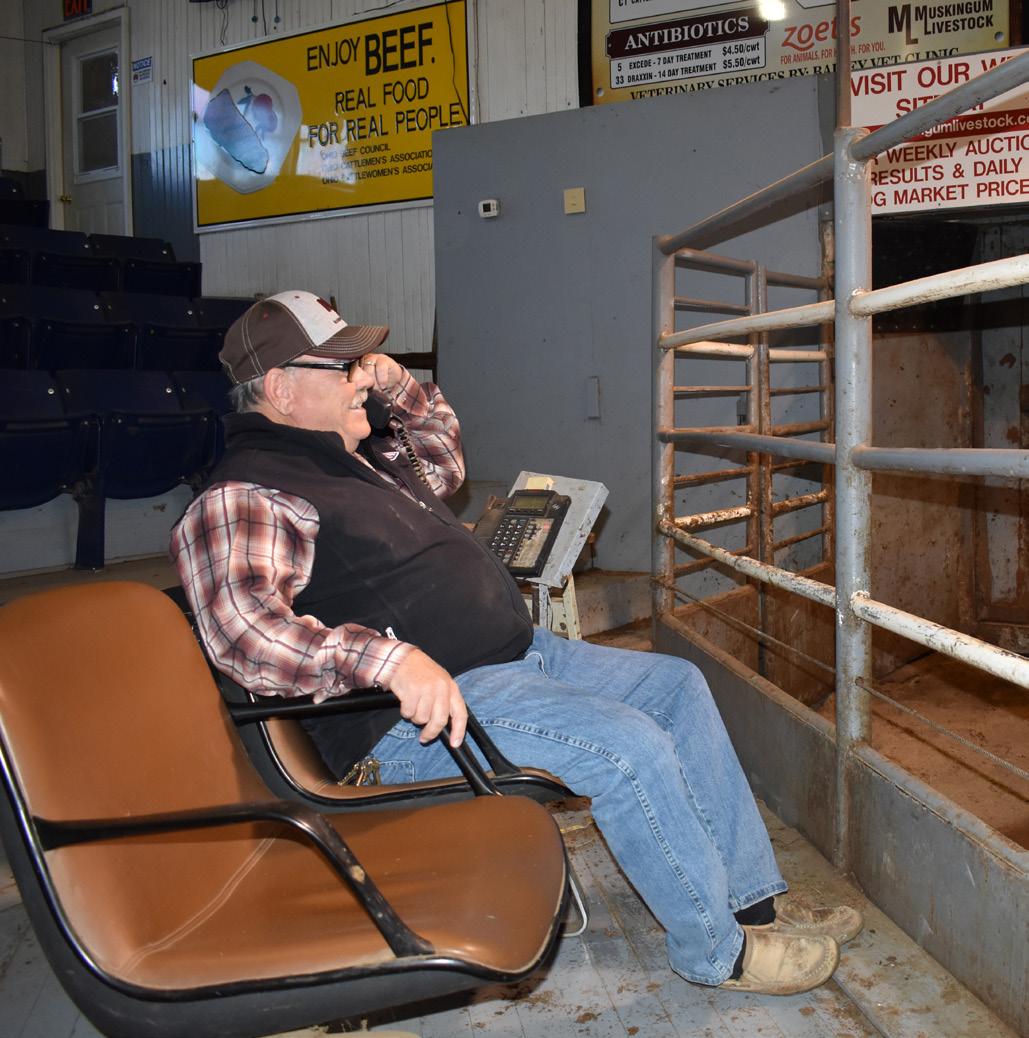
7 minute read
3018
OCA Industry Service Award Denny Ruff mentors cattle producers inside and outside the auction ring
It’s Wednesday, auction day. All eyes are on the sale pen as livestock flows in and out and the auctioneer does his smooth and fast talking. Bids are made and sales confirmed. It’s a whirlwind of activity and in the center of it is Denny Ruff, general manager of the Muskingum Livestock Auction. Feet propped up on the bars of the sale pen, a landline phone in one ear and a cell phone in the other, Denny takes it all in. Satisfied that he has secured a nice lot of feeder cattle for a buyer, Denny plops his feet down on the ground and stretches his knee a bit before heading to the back to check on things. While his stride is purposeful, it’s not as fast as it used to be. But then again he’s been doing this his entire adult life, and he’s put in a countless number of miles and hours inside the auction located just outside Zanesville’s downtown. “It’s all I know. I have a high school degree but didn’t go to a four year college. I learned all of this by watching and learning. This is who I am and now that I’ve gotten to a certain age, it’s too late to change,” he said.
Advertisement
Story & Photos by Amy Beth Graves Not that there’s any reason for Denny to change careers at age 64. For almost 80 years, Muskingum Livestock Auction has been an integral part of the livestock industry, and Denny has seen the trends come and go over the years and is as invested in the business as the first day he joined more than 30 years ago. His contributions to the cattle industry haven’t gone unnoticed, and he is the recipient of the Ohio Cattlemen’s 2021 Industry Excellence award. “I’m humbled they would consider me for this,” he said. “I’m an auction man. I’ve always said the true price discovery (of your livestock) is at the auction and I believe that. When you’re bringing in a nice set of livestock and buyers are competitively bidding on them, you’re getting the most value that day.” Agreeing is Dennis Michel, a Fairfield County cattleman and chairman of the Muskingum Livestock Auction for about two decades. The auction has seven board members who represent stakeholders. “I don’t think you could meet a nicer guy. Denny’s presence has been steady over the years because he does such a good job,” said Dennis who has a feeder-to-finish operation. Over the years, he’s relied on Denny to both purchase and sell cattle for him through the Muskingum Livestock Auction. Every week about a dozen of his fat cattle head to the auction pen in Zanesville. “Denny does everything in his power to try to help someone get a good price on their cattle. He builds trust and people to go him for advice,” Dennis said. “He keeps up on the times and trends and has been a good mentor to so many over the years. He does such an excellent job that I don’t what we’ll do when – or if – he retires.”
From hogs to cattle
Denny grew up in a family that raised cattle and hogs in Fairfield County and was always particularly fond of hogs. When he started at Muskingum Livestock in 1987 after working part-time at the Lancaster Producers Auction, hogs were big
then. He and another “This is where I’m meant to be and shot, start them on grain employee spent their weeks moving feeder I wouldn’t have it any other way.” and turn them out.” hogs until the hog market plummeted and hogs were no longer the main livestock moving through the auction. This was around the time Denny became Muskingum Livestock Auction’s general manager in 1999. It was also when Denny started learning more about cattle, eventually raising them on a farm he and his wife, Judy, bought about 30 miles south of Zanesville. “It was a bit of a learning curve focusing more on cattle. I had always paid attention to the fed cattle and what they were bringing and what they were worth but when you’re representing your customer, you need to know exactly what to look for,” he said. Today about 50,000 cattle, as well as a few sheep, goats and hogs, make their way in and out of the Muskingum Livestock auction, conveniently located just a few miles from Interstate 70. “Where we’re set here in southeastern Ohio … our location is super,” Denny said. “There have been a lot of changes with auctions over the years but I think that while there aren’t as many today, I still think that there’s a place for auction houses. For some it’s the best way for them to sell their cattle.” Denny elaborated that one reason why not as many auction houses exist auction starts at 9 a.m. The fed cattle are the first to go in the ring and feeder cattle the last. Denny spends his time making sure everything goes smoothly, eating and talking with buyers and bidding on livestock for customers. He doesn’t get to go home until the last animal is sold, which is usually late in the evening. “One sale we quit at 5:30 a.m. That was the longest day I ever put in here. There are so many times I’ve been here 24 hours easy and crashed in my chair for a bit,” he said, pointing to a chair in his office. “We don’t mess around. We’ve got a good crew.” Keeping good employees on the payroll is one of Denny’s biggest challenges. “Finding good labor is tough,” he said. “Years ago we had all types of farm kids come in and work but now it’s only a few people who are reliable. There are some that would love to help out but when we need them the most, they’re busy in the spring and fall.” At his home farm in Morgan County, Denny backgrounds about 100 cattle a year, buying the calves at the Muskingum Livestock Auction and later reselling them at the action. “I know where my paycheck comes from,” he laughed. “I try to practice what I preach. I take home the calves, give them a booster A mentor to many Over the years, Denny has given his share of advice to fellow cattlemen looking to sell their animals at the auction. Every year he puts about 40,000 miles on his pickup, traveling a 50-mile radius to help cattle producers determine when their animals should go to market. His No. 1 piece of advice? Do the basics in taking the best care of that animal before it goes to the auction. “If someone calls in and says what should I do with my animal, I tell them to do the basics. Get them weaned, castrated, bunk broke and a vaccine in them. That’s what buyers want -- the basics. They prefer they’re not trailer weaned,” he said. “My goal is to get good cattle to the auction because when that happens, you get a good price and both the buyers and sellers keep coming back.” While Denny is the type who likes to see animals or merchandise in person, he’s come to recognize that online sales are becoming more popular. He’s currently working on plans to start video sales of feeder calves. But other than this new addition and a few tweaks here and there, he’s happy with how the sale runs every week. He’s also pleased to be working side-by-side with his son Trevor, who is an auctioneer at the sale, and his other son, Garth, was recently proin Ohio nowadays is because the num- moted to beef cattle field specialist ber of small meat packers has dramati- with Ohio State University Extension. cally shrunk over the years. While working 70-80 hours a week “Back in the ‘70s and early ‘80s, at times can be both mentally and we had a lot of little packers that physically exhausting, Denny says created quite a market. All those running the livestock auction is little packers back then, I can the perfect job for him. recall there being 20-25 buyers “Why do I do it? I love it. I buying fed cattle. Now it’s just want to do this as long as I’m three to four buyers,” he said. wanted and am healthy … may For Denny and about three be not as many hours though,” dozen employees, auction day he laughed. “This is where I’m is a marathon. Denny typically meant to be and I wouldn’t have it shows up around 5:30 a.m. to any other way.”make sure all the livestock have been sorted and weighed before the











